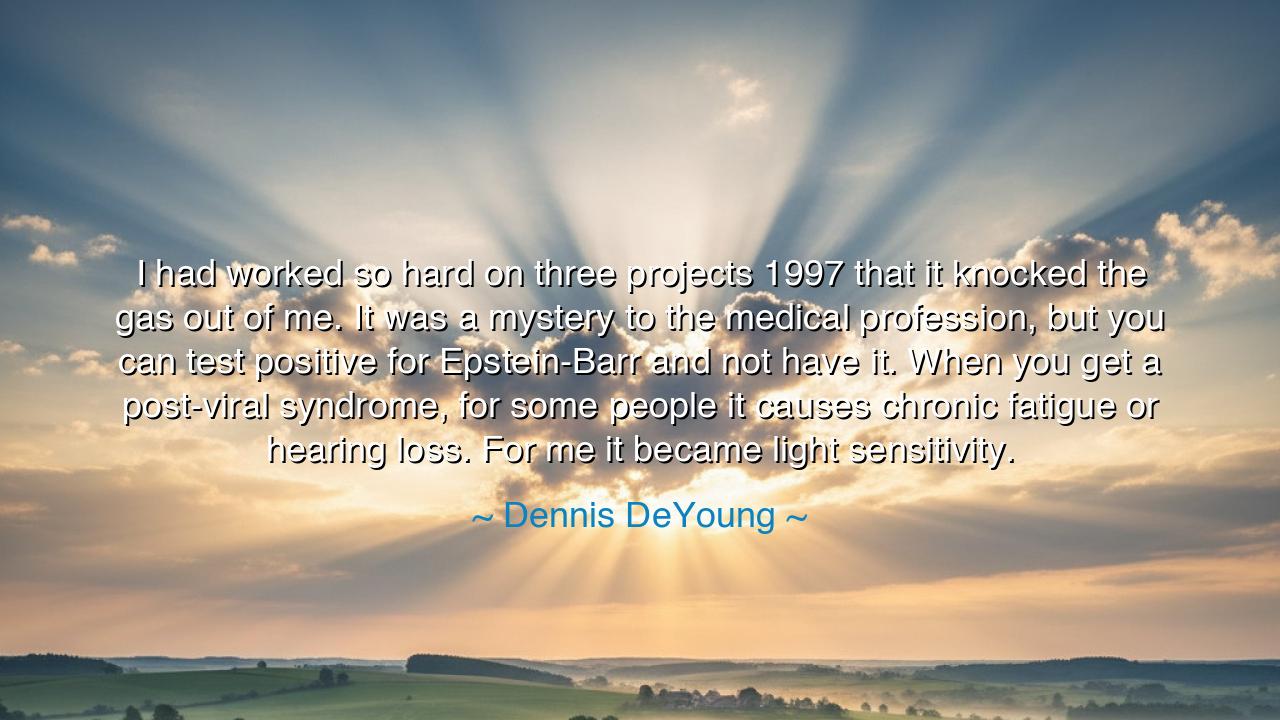
I had worked so hard on three projects 1997 that it knocked the
I had worked so hard on three projects 1997 that it knocked the gas out of me. It was a mystery to the medical profession, but you can test positive for Epstein-Barr and not have it. When you get a post-viral syndrome, for some people it causes chronic fatigue or hearing loss. For me it became light sensitivity.






“I had worked so hard on three projects in 1997 that it knocked the gas out of me. It was a mystery to the medical profession, but you can test positive for Epstein-Barr and not have it. When you get a post-viral syndrome, for some people it causes chronic fatigue or hearing loss. For me it became light sensitivity.”
Thus spoke Dennis DeYoung, musician, composer, and frontman of the legendary band Styx — a man who, after years of brilliance beneath the stage lights, found himself unable to stand beneath their glare. His words, though born of illness, are filled with the quiet courage of reflection. Beneath their surface lies a deeper meditation on human fragility, the mystery of the body, and the hidden cost of relentless striving. His confession is not only a chronicle of illness, but a lesson in humility — that even the strongest flame, if not tended with care, can consume itself.
In the world of music, DeYoung was known for his drive, his perfectionism, and his devotion to his art. The year 1997 marked a period of great creative intensity — a time when he poured every ounce of energy into three ambitious projects. But what he did not know was that such unyielding passion, untempered by rest, had a price. His body, like an instrument played too long and too hard, began to falter. What followed was a mysterious illness — a post-viral syndrome that doctors could not fully explain. Though he tested positive for Epstein-Barr, the diagnosis did not fit neatly into medical certainty. He was left adrift in the gray realm between wellness and disease, where even science hesitates and the human soul must learn endurance.
This is a story as old as creation — of those who soar too high and find themselves struck by their own brilliance. The ancients told of Icarus, who, in his yearning to fly, ignored the warnings of moderation and flew too close to the sun. His wings, crafted with care yet worn by pride, melted in the heat of his ambition. DeYoung’s tale is a modern echo of that myth. His wings were not of wax, but of will — yet they, too, met the blinding power of light. For what the sun was to Icarus, the spotlight was to DeYoung: a force both exalting and destructive. When light, once a symbol of glory, became the very thing he could not endure, his story took on the tragic symmetry of legend.
But in his reflection, there is no bitterness — only awareness. DeYoung’s words remind us that even the most powerful souls must bow to the limits of the flesh. His light sensitivity became not only a physical ailment but a metaphor for awakening. For too long, he had lived in constant illumination — the endless glare of expectation, applause, and pressure. When his body rebelled, it forced him to step into the shadows of stillness, where he rediscovered the truth that the spirit, like the body, requires rest. There, away from the fever of creation, he found renewal — not in sound and spectacle, but in silence and surrender.
Throughout history, the body’s rebellion against excess has been the teacher of kings and artists alike. Consider Charles Darwin, whose lifelong illness followed his great voyage aboard the Beagle. The strain of his discoveries, the pressure of revelation, and the isolation of genius wore upon his frame until his nerves trembled and his body broke. Yet, like DeYoung, he turned his suffering into wisdom. For both men, weakness became a form of strength — a chastening reminder that creation is a divine act, but even divinity demands rest between its labors.
The deeper lesson of DeYoung’s words is this: that no ambition, however noble, should come at the cost of one’s well-being. The world may celebrate endless work and tireless pursuit, but the wise know that the soul cannot flourish in exhaustion. The body is not a servant to be driven, but a temple to be honored. When it sends warning — through pain, fatigue, or fragility — it is not betrayal, but mercy. It calls us back from the precipice of overreach, reminding us that the light we chase must also be the light by which we heal.
So, my listener, take this wisdom to heart: seek balance between passion and peace. Create, but also pause. Strive, but also breathe. Let your ambition burn brightly, but never let it consume you. For if you would build something lasting — a song, a dream, a life — you must learn to dwell in both the light and the shade. Dennis DeYoung’s story stands as both caution and inspiration: that even when the body falters, the spirit can rise renewed, carrying the wisdom that no success is greater than the gift of health, and no spotlight brighter than the quiet glow of inner peace.






AAdministratorAdministrator
Welcome, honored guests. Please leave a comment, we will respond soon